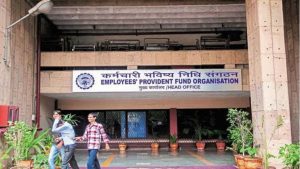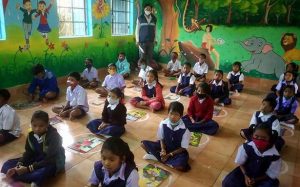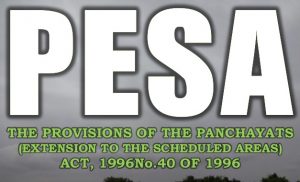Today Current Affairs: 22nd November 2021 for UPSC IAS exams, State PSC exams, SSC CGL, State SSC, RRB, Railways, Banking Exam & IBPS, etc
Table of Contents
Employees’ Provident Fund Organization, EPFO:

The Central Board of Trustees (CBT) which is the apex decision-making body of Employees’ Provident Fund Organization, EPFO has approved constitution of four sub-committees comprising members of the Board from employees, employers’ side as well as from representatives of the Government side on different matters.
- Two committees on Establishment related matters and futuristic implementation of Social Security Code will be headed by the Minister of State Labour and Employment Rameswar Teli.
- The remaining two committees on Digital capacity building and Pension related issues will be headed by Labour and Employment Secretary Sunil Barthwal.
- The decision to this effect was taken at the 229th meeting of the Central Board of Trustees which was held in New Delhi under the chairmanship of Union Minister for Labour and Employment Bhupender Yadav.
- Besides, the Board decided to empower the Finance Investment and Audit Committee to decide upon the investment options, on case-to-case basis, for investment in all such asset classes which are included in the Pattern of Investment.
- The minister also released a booklet titled ‘Nirbadh: seamless service delivery.’ This booklet is a compilation of initiatives taken and strategies adopted by EPFO towards successful digital transformation from ‘EPFO to e-EPFO’ over the last three years.
Light Combat Helicopter:

The Prime Minister handed over the indigenously-built Light Combat Helicopter (HAL’s LCH), two small drones (‘SWITCH 1.0 UAV’ and ‘MR-20) built by Indian start-ups to the Air Force.
- LCH is a truly ‘Make in India’ product built with private industry participation.
- LCH is a new addition to Hindustan Aeronautics Limited (HAL’s) helicopter division.
- This twin-engine helicopter is a dedicated combat helicopter of 5 to 8-tonne class.
- The LCH incorporates advanced technologies and stealth features for effective combat roles and is designed to carry out roles such as destruction of enemy air defence, counterinsurgency, search and rescue, anti-tank, Counter Surface Force Operations etc.
- The LCH is the only attack helicopter in the world that can land and take off at an altitude of 5,000 m with a considerable load of weapons and fuel.
- It is effective even in temperatures ranging from minus 50 degrees Celsius on snow peaks to 50 degrees Celsius in the desert.
- LCH will eventually be deployed along the Line of Actual Control with China, in addition to the AH-64E Apache helicopters in service.
‘SWITCH 1.0 UAV’ and ‘MR-20:
‘
- SWITCH 1.0 UAV, with its peerless capabilities of 1.5 hours flight time and 15 kms range at more than 4500 m take-off altitude.
- It has an endurance of approximately 90 minutes and will support the Indian Army’s most demanding surveillance operations under harsh environments and high altitudes for day and night surveillance across India’s borders.
- The MR-20 hexacopter drones have a capacity to ferry loads of up to 20kg.
- It will be used to ferry food, essential items, emergency medical aid, ammunition and weapons to troops deployed at heights in forwarding areas.
Project Samhati: Odisha

The new National Education Policy 2020 lays emphasis on imparting teaching in the mother tongue in primary classes. However, when seen from the context of the diverse language-base of tribal people, the task appears to be quite onerous.
- In this scenario, Odisha’s decade-long experiment in multilingual education may come in handy to take up the challenge.
- The most important aspect of Mother-Tongue Based Multi-Linguial Education (MTBMLE) is that it helps save endangered tribal languages.
- The ST and SC Development Department of the Odisha government has started a project called ‘Samhati.
- It intends to address the language issues faced by tribal students in early grades or elementary classes.
- Under this, the department plans to cover approximately 2.5 lakh students in 1,450 primary schools in the State.
- Implementing Agency: The Scheduled Castes and Scheduled Tribes Research and Training Institute (SCSTRTI) along with the Academy of Tribal Language and Culture (ATLC), Bhubaneswar are implementing the project.
- Multilingual Learning: Under Samhati, it has been decided that all teachers of primary level would be provided functional knowledge of tribal languages and ways of communicating with tribal students.
- Odisha’s adivasi communities are as diverse as 21 spoken languages. Out of the 21 languages, Santhali, the only language which has been included in the eighth schedule of Constitution.
- It is taught in its own ol chiki script while the rest of tribal languages have Odia scripts.
- Only six tribal languages — Santali, Ho, Soura, Munda and Kui — have a written script.
- These students are a multilingual group unlike mono-lingual groups in regular schools.
Special Credit Linked Capital Subsidy Scheme:

The Ministry of Micro, Small and Medium-sized Enterprises (MSMEs) launched the Special Credit Linked Capital Subsidy Scheme (SCLCSS) for the services sector.
- The scheme will help in meeting the technology-related requirements of enterprises in the services sector.
- It has a provision of 25% capital subsidy for procurement of plant and machinery and service equipment through institutional credit to the Scheduled Caste – Scheduled Tribe MSMEs without any sector-specific restrictions on technology up-gradation.
- It will facilitate technology up-gradation to MSEs, improvement in Quality of services by MSMEs, enhancement in productivity, reduction in waste and shall promote a culture of continuous improvement.
- It will also promote the innovation, digital empowerment and design interventions of MSMEs.
Credit Linked Capital Subsidy Scheme for Technology Upgradation:
- It was launched in 2000.
- The objective of the Scheme is to facilitate technology up-gradation in MSEs by providing an upfront capital subsidy of 15% (on institutional finance of upto Rs 1 crore availed by them) for induction of well-established and improved technology in the specified 51 sub-sectors/products approved.
- In other words the major objective is to upgrade their plant & machinery with state-of-the-art technology, with or without expansion and also for new MSEs which have set up their facilities with appropriate eligible and proven technology duly approved under scheme guidelines.
Repeal Of Three Contentious Farm Laws:

Prime Minister Narendra Modi in his address to the nation on November 19 announced the repeal of three contentious farm laws.
- He assured farmer groups protesting against these laws that the legislative process for the repeal would be completed in the upcoming Winter Session of the Parliament.
Three Farm laws:
- The Farmers Produce Trade and Commerce (Promotion and Facilitation) Act, 2020, which is aimed at allowing trade in agricultural produce outside the existing APMC (Agricultural Produce Market Committee) mandis;
- The Farmers (Empowerment and Protection) Agreement on Price Assurance and Farm Services Act, 2020, which seeks to provide a framework for contract farming;
- The Essential Commodities (Amendment) Act, 2020, which is aimed at removing commodities such as cereals, pulses, oilseeds, edible oils, onion and potato from the list of essential commodities.
Repealing a law is one of the ways to nullify a law. A law is reversed when Parliament thinks there is no longer a need for the law to exist.
- Legislation can also have a “sunset” clause, a particular date after which they cease to exist.
- The government can repeal the laws in two ways — it can either bring a Bill to repeal the three laws or promulgate an ordinance that will have to be subsequently replaced with a Bill within six months.
- For repeal, the power of Parliament is the same as enacting a law under the Constitution.
- Article 245 of the Constitution which gives Parliament the power to make laws also gives the legislative body the power to repeal them through the Repealing and Amending Act.
- The Act was first passed in 1950 when 72 Acts were repealed.
- A law can be repealed either in its entirety, in part, or even just to the extent that it is in contravention of other laws.
- Laws can be repealed in two ways — either through an ordinance, or through legislation.
- In case an ordinance is used, it would need to be replaced by a law passed by Parliament within six months.
- If the ordinance lapses because it is not approved by Parliament, the repealed law can be revived.
Smart Policing Index 2021:

According to a nationwide survey conducted by Indian Police Foundation (IPF), police in Bihar and Uttar Pradesh scored the lowest among all States when it came to perception of “sensitivity”.
- Earlier, the National Human Rights Commission (NHRC) had asked the Union Ministry of Home Affairs (MHA) and the State Governments to set up Police Complaints Authorities as per the judgment in Prakash Singh vs. Union of India, 2006.
- The SMART Policing idea was envisioned, articulated and introduced by the Indian PM at the Conference of DGPs of State and Central Police Organizations, held at Guwahati, in the year 2014.
- It envisaged systemic changes to transform the Indian Police to be: Strict and Sensitive, Modern and Mobile, Alert and Accountable, Reliable and Responsive, Techno-savvy and Trained (SMART).
- The strategy combined the development of physical infrastructure, technology adoption, a focus on the critical soft skills and attitudes, as well as a deep commitment to the values of professional excellence and service to the people, considered essential to take the Indian Police to the next level.
SMART Policing Index:
- The purpose of the IPF survey was to gather information on citizens’ perceptions about the impact of the SMART policing initiative.
- Indian Police Foundation (IPF) is a Delhi-based think tank set up by eminent citizens including serving and retired police officers, civil servants, academics and lawyers etc – for each individual state or Union territory.
- The survey had 10 sets of questionnaires, which included:
- Six indices of “Competence-Based Indicators” dealing with issues such as police sensitivity, accessibility, responsiveness and technology adoption among others;
- Three indices of “Value-Based indicators” dealing with integrity of the police; and
- One index of “Trust”.
- The SMART scores are set on a scale of 1 to10 and are indicative of the levels of citizen satisfaction, a score of 10 being the highest level of satisfaction.
Findings of SMART Policing Index 2021:
- Despite being attacked for insufficient sensitivity, declining public confidence and growing concerns about the quality of policing, a majority of citizens (a weighted average of 66.93%) believes that the police are doing their job well and strongly support the police.
- Southern states and some in the Northeast fared better on most policing indices compared to states in the north.
- The top five states with the highest score on overall policing are Andhra Pradesh, Telangana, Assam, Kerala and Sikkim.
- From bottom upwards are Bihar, Uttar Pradesh, Chhattisgarh, Jharkhand and Punjab.
Kulbhushan Jadhav Case:

Pakistan’s Parliament has enacted a law to give Indian death-row prisoner Kulbhushan Jadhav the right to file a review appeal against his conviction by a military court.
- The bill was enacted to implement an order of the International Court of Justice (ICJ).
- However, India points out that the law has several “shortcomings”, and that steps are needed to implement the ICJ’s order “in letter and spirit”.
Kulbhushan Jadhav Case:
- Arrest: A 51-year-old retired Indian Navy officer, Jadhav was sentenced to death by a Pakistani military court on charges of espionage and terrorism in April 2017.
- In December 2017, Jadhav’s wife and mother were allowed to meet him across a glass partition, with India contesting Pakistan’s claim that this was consular access at ICJ.
- Denial of Consular Access: India approached the ICJ against Pakistan for denial of consular access (Vienna Convention) to Jadhav and challenging the death sentence.
- ICJ Ruling: In 2019, the ICJ ruled that Pakistan was obliged under international laws to provide by means of its own choosing “effective review and reconsideration” of Jadhav’s conviction.
- Pakistan’s Response: In the wake of the ICJ order, the Pakistan government had promulgated a special ordinance to allow Jadhav to file a review.
- Pakistan’s Parliament has passed the International Court of Justice (Review and Reconsideration) Bill, 2021 aimed to fulfill the obligation under the verdict of the ICJ.
- India believes the Bill reiterates a 2019 ordinance passed by Pakistan, without creating a machinery to facilitate an effective review and reconsideration in Kulbhushan Jadhav’s case.
- Extraordinary Power to Municipal Court: It invites municipal courts in Pakistan to decide whether or not any prejudice has been caused to Jadhav on account of the failure to provide consular access.
- This is clearly a breach of the basic tenet, that municipal courts cannot be the arbiter of whether a State has fulfilled its obligations under international law.
- It further invites a municipal court to sit in appeal.
PESA Act:

One Day National Conference was organized on the Provisions of the Panchayats (Extension to the Scheduled Areas) Act, 1996 (PESA) to celebrate 25th year of PESA Act, as part of Azadi Ka Amrit Mahotsav.
- The Panchayats (Extension to Scheduled Areas) Act, 1996 or PESA Act is a law enacted by the Government of India for ensuring self-governance through traditional Gram Sabhas for people living in the Scheduled Areas of India.
- It was enacted by Parliament in 1996 and came into force on 24th December 1996.
- The PESA is considered to be the backbone of tribal legislation in India.
- PESA recognises the traditional system of the decision-making process and stands for the peoples’ self-governance.
- To promote local self-governance in rural India, the 73rd constitutional amendment was made in 1992. Through this amendment, a three-tier Panchayati Raj Institution was made into a law.
- However, its application to the scheduled and tribal areas under Article 243(M) was restricted.
- After the Bhuria Committee recommendations in 1995, Panchayat Extension to Scheduled Areas (PESA) Act 1996 came into existence for ensuring tribal self-rule for people living in scheduled areas of India.
- The PESA conferred the absolute powers to Gram Sabha, whereas state legislature has given an advisory role to ensure the proper functioning of Panchayats and Gram Sabhas.
- The power delegated to Gram Sabha cannot be curtailed by a higher level, and there shall be independence throughout.
Guru Nanak Dev Jayanti:

Guru Nanak Dev Ji Jayanti, also known as Guru Nanak’s Prakash Utsav and Guru Nanak Dev Ji Gurpurab, celebrates the birth of the first Sikh guru, Guru Nanak.
- Guru Nanak Jayanti is celebrated on the full moon day of Kartik month, also known as Kartik Poornima.
- This year, followers of Guru Nanak will celebrate the Guru Nanak Jayanti on November 19, 2021.
- It will mark the 552nd birth anniversary of Guru Nanak Dev Ji, the first of the ten Sikh gurus.
About Guru Nanak Dev:
- Guru Nanak Dev (1469-1539) was born in a village, Talwandi Rai Bhoe, near Lahore (it was renamed later as Nankana Sahib).
- He initiated inter-faith dialogue in the 16th century and had conversations with most of the religious denominations of his times.
- His written compositions were included in the Adi Granth compiled by the fifth Sikh Guru Arjan Dev (1563-1606).
- It is known as Guru Granth Sahib after the additions made by the 10th guru Guru Gobind Singh (1666-1708).
- Guru Nanak was a great champion of equality. He aimed at creating a casteless society in which there is no hierarchy.
- For him, the differences and multiple identities based on caste, creed, religion and language were irrelevant.
- He had said, “Preposterous is caste, vain the distinction of birth. The Lord gives shelter to all beings”.
- Referring to women, the Guru Nanak says: “How can they be inferior when they give birth to men? Women as well as men share in the grace of God and are equally responsible for their actions to Him.”
- The spirit of living together and harmoniously working together is a consistent thread of thought that runs through Guru Nanak hymns.
- He founded three pillars of Sikhism namely Naam Japna, Kirat Karni, and Vand Chakna.
- He consciously went on long journeys (called uddasian) to far off places along with his two companions Bhai Bala, a Hindu, and Bhai Mardana, a Muslim, to hold dialogues with many saints and Sufis even, some charlatans who claimed some spiritual powers and had some social following.




